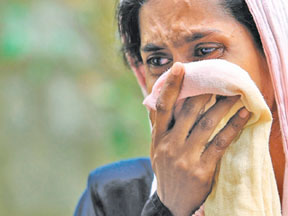Lapses in law implementation worsen women's plight
By Lalin Fernandopulle
Added to the magnitude of problems women face, lapses in implementing
laws to penalise perpetrators of rape have raised eyebrows in civil
society and women's rights organisations. Limitations and loopholes in
the law have enabled sex offenders to get away and continue to commit
the crime.
 Attorney-at-Law Cyrene Siriwardena said that though Sri Lanka has
excellent laws to curb violence against women, the laws are not
vigorously implemented to take perpetrators to task. Attorney-at-Law Cyrene Siriwardena said that though Sri Lanka has
excellent laws to curb violence against women, the laws are not
vigorously implemented to take perpetrators to task.
Many who commit violence against women do not face legal
consequences, while some go scot-free as their crimes are not reported
by women or their spouses due to embarrassment or fear facing revenge.
Only a small percentage of violence against women is reported to the
police as there isn't sufficient protection for the victim or witness,
Siriwardena told a Women's Day seminar organised by World Vision Lanka
last week.
She said that the Witness Protection Bill when enforced as law will
ensure protection of the victim and witness. She said that if 100 face
sexual harassment 50 will seek medication and less than 10 will report
to the police.
However, she said that laws alone cannot solve this problem in toto
though they have a preventive value in creating barriers to commit
crimes against women. Fear of legal sanctions is not enough to check
cases of violence.
An attitudinal change is vital to ensure the rights and safety of
women. Domestic violence includes violence that takes place between
parents and children, siblings, spouses, grandparents, uncles, aunts,
relatives by marriage or people in familial relationships to one
another.
Intimate Partner Violence (IPV) refers to violence between spouses or
partners in an intimate relationship, and can include cohabiting
ex-partners of the victim-survivor.
While women can be perpetrators of domestic violence, research shows
that the vast majority of perpetrators are men who act violently towards
women and girls.
Sexual cases take around six to 12 years to conclude. The gray area
where a girl between 16-18 who could consent to have sex but cannot get
married until she turns 18 is being reviewed by law makers.
Around 28 percent of those who commit rape for the first time are
between 15-19 and are considered delinquents. Citing statistics of a
survey on violence against women she said that 15 percent of men had
committed rape and around 61 percent had committed the crime more than
once.
“What is shocking is that the perpetrators of rape are labelled
delinquents which is a major concern that should grab the attention of
policy makers,” Siriwardena said.
There are around five rape cases reported in the country daily and
violence against women is on the rise. Cases of violence increased from
3,624 in 2010 to 4,393 from 2012 to 2014 and around 44 percent of the
women are beaten while in pregnancy.
Violence during pregnancy is on the rise, the survey revealed.
“The Kahawatte incident and the sex worker beaten by a police
constable indicates the growing trend of violence against women. Sexual
entitlement which is how one perceives the other as being a motivating
factor for crimes against women," she said.
Legal experts are also of the view that alcohol is not a reason for
violence against women and it is the least reported motivation.
Manique Gunaratne of the Employers’ Federation of Ceylon said that
women with disabilities are not included in the decision-making process.
Over-protection and lack of independence prevents those with
disabilities playing a role in society. Today, technology empowers women
with disabilities.
Digital information to make decisions and online work saves time
enabling them to spend time with their families. "Intellectual
disabilites is a major obstacle for integration. Such people need more
attention and the concern of others,” Gunaratne said.She said that
children of disabled mothers are more compassionate and helpful to
others. Not sending female children with disabilities to school creates
plenty of problems for parents and caretakers. Today, there are many
self-employment schemes but few with opportunities and openings for
disabled women. Social organisations and policy makers should help make
products of disabled women more competitive to gain access to markets
and enhance their level of income through which they could improve the
quality of their products. |

